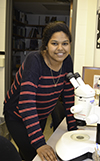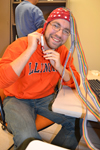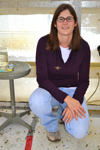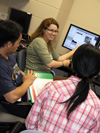Stories about... Integrative Graduate Education and Research Traineeship (IGERT)
 VInTG IGERT Inspires Ph.D. Student Lynette Strickland to Choose a Career in Research
VInTG IGERT Inspires Ph.D. Student Lynette Strickland to Choose a Career in Research
May 2, 2016
How did a little girl who had never been further than her home state of Texas and dreamed of being a veterinarian end up a researcher at Illinois, who also spends large blocks of time in Panama and is passionate about studying, in particular, the colorful Chelymorpha, or tortoise beetle? Lynette Strickland, an Animal Biology Ph.D. student who works in the lab of Illinois researcher Carla Caceres, credits the NSF-funded VInTG (Vertically Integrated Training with Genomics) IGERT.
FULL STORY
 IGERT Trains Students at the Intersection of Neuroscience and Engineering
IGERT Trains Students at the Intersection of Neuroscience and Engineering
December 6, 2012
"We're trying to develop a culture and a community of people here on campus that are interested in the intersection of neuroscience and engineering."
According to program coordinator Pat Grenda, this is the goal of the Neuroengineering IGERT at Illinois. Short for "Neuroengineering: A Unified Educational Program for Systems Engineering in Neuroscience," the five-year Ph.D. program is funded by a National Science Foundation Integrative Graduate Education and Research Traineeship (IGERT) grant. In its fourth year, the IGERT currently has 45 students enrolled in four cohorts.
FULL STORY
 Neuroengineering IGERT Students Experience Interdisciplinary Research
Neuroengineering IGERT Students Experience Interdisciplinary Research
One student wants to discover how the brain enables complex thought, such as philosophy. Another wants a field rewarding enough to get him out of bed and to work every morning. Another student, who heard about the IGERT program while jogging, finds the psychology-engineering intersection intriguing and the engineering tools crucial to his work. Still another saw the IGERT as an opportunity to acquire resources, knowledge, and connections in the field of engineering that she wouldn't have had otherwise. No matter why students chose the Neuroengineering IGERT at Illinois, they find interdisciplinary research at the intersection of neuroscience and engineering to be challenging, yet exciting.
FULL STORY
 VINTG IGERT Students Receive Outside-of-the-Box Training in Genomics
VINTG IGERT Students Receive Outside-of-the-Box Training in Genomics
November 16, 2011
Nine new doctoral students arrived on campus this fall to receive a new kind of training in genomics that "thinks outside the box." The premise of this training model: to produce a new generation of biologists on the cutting edge of genome-enabled science, who can specifically address how genomes interact with the environment to create diversity.
FULL STORY
 Amos's Atomic Microscope Gives Students Close-Up Look at Cells
Amos's Atomic Microscope Gives Students Close-Up Look at Cells
August 26, 2011
A few adventurous young bioengineers are taking cell research to a whole new level—the atomic level. University of Illinois bioengineering students now have access to a new tool for looking at cells called an Atomic Force Microscope (AFM). In March, the Roy J. Carver Charitable Trust provided the $290,000 machine, in the form of a grant, to the university and to bioengineering lecturer Jennifer Amos. Amos will lead a new class this fall called “The Bioreactor Lab” that will focus on teaching students about the use Atomic Force Microscopy in bioengineering.
STORY













.jpg)
















